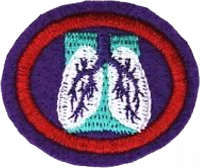Difference between revisions of "AY Honors/Respiratory System/Requirements/pt-br"
(Created page with "</noinclude>Qual a principal função das células ciliadas, com cílios móveis? <noinclude>") |
(Created page with "</noinclude>Explicar como os sistemas circulatório e respiratório estão intimamente ligados. <noinclude>") |
||
| Line 19: | Line 19: | ||
<section begin=challenge /> | <section begin=challenge /> | ||
| − | <b>6. <section begin=req6 /><noinclude> | + | <b>6. <section begin=req6 /><noinclude></noinclude>Qual a relação entre respiração celular e a respiração pulmonar? |
| − | </noinclude> | + | <noinclude></noinclude><section end=req6 /></b> |
| − | <noinclude | ||
| − | |||
<section end=challenge /> | <section end=challenge /> | ||
| − | <b>7. <section begin=req7 /><noinclude> | + | <b>7. <section begin=req7 /><noinclude></noinclude>Explicar como os sistemas circulatório e respiratório estão intimamente ligados. |
| − | </noinclude> | + | <noinclude></noinclude><section end=req7 /></b> |
| − | <noinclude | ||
| − | |||
<b>8. <section begin=req8 /><noinclude><div lang="en" dir="ltr" class="mw-content-ltr"> | <b>8. <section begin=req8 /><noinclude><div lang="en" dir="ltr" class="mw-content-ltr"> | ||
Revision as of 20:59, 1 June 2021
Nível de Habilidade
2
Ano
2012
Version
16.02.2026
Autoridade de Aprovação
Divisão Sul Americana
1. Quais são as estruturas que formam o sistema respiratório? Ilustrar e descrever as principais funções de cada uma.
2. Os pulmões direito e esquerdo são iguais? Qual a diferença anatômica entre eles?
3. Quais são os 2 principais gases do nosso organismo? O que é troca gasosa? Descrever as vias condutoras do ar até o momento da troca gasosa.
4. O que é alvéolo e qual a sua função? Através de desenhos ou figuras, ilustrar um alvéolo demonstrando o momento da troca gasosa.
5. Qual a principal função das células ciliadas, com cílios móveis?
6. Qual a relação entre respiração celular e a respiração pulmonar?
7. Explicar como os sistemas circulatório e respiratório estão intimamente ligados.
What is the importance of hemoglobin and iron for the oxygenation of the body?
Describe in detail the movements of inspiration and exhalation. Which is the importance of the diaphragm muscle for these movements?
Which organ of the central nervous system controls breathing? Why?
What is the normal respiratory rate of:
- a.
Newborns
- b.
Children
- c.
Adults
Define the following terms about respiratory alterations:
- a.
Eupnea
- b.
Tachypnea
- c.
Bradipnea
- d.
Dispnea
- e.
Ortopnea
- f.
Apnea
13.
Study the following respiratory diseases and describe for each: how it occurs/is acquired, transmission (if that is the case), treatment and prevention:
- a.
Asthma
- b.
Tuberculosis
- c.
Pneumonia
- d.
Influenza / upper respiratory tract infections
- e.
Pulmonary emphysema
- f.
Pulmonary thromboembolism
- g.
Pneumoconiosis
- h.
Cystic fibrosis
14.
Research the effects of smoking on the respiratory system. Present your results in one of the following ways:
- a.
Written report, at least 500 words
- b.
Verbal presentation, at least 5 minutes
- c.
Display with posters and signs
- d.
Poem or music
15.
Conduct a survey in your region or state, comparing the quality indices of the air. How can these indices be improved? What can you do to improve them?



